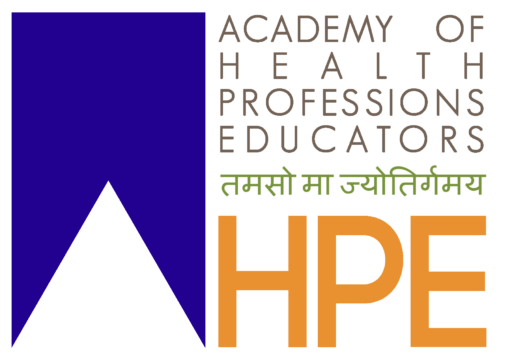Dear All,
It is my pleasure to write this presidential message on behalf of the Academy of Health Professions Educators (AHPE). This organization, launched to further quality and relevance of health professions education, has completed six years this year. I am proud that many of its founder members have contributed to the innovations in health professions education and participated in policy making decisions, that are evident in the changes observed in the curricula of various health professions in India.
This year, the Ministry of Health and Family Welfare has approved the new curriculum framed by the Medical Council of India (MCI). As you all aware, this is a competency-based undergraduate curriculum for the Indian Medical Graduate. Many of you must have undergone training for the same in Basic and Advanced Courses held by MCI Nodal and Regional Centres. However, there is always a gap between training received in a protected environment conceptualizing activities that may happen in the future, and implementing what is learnt during in real life. All of us are approaching the situation with some anxiety, apprehension and loads of expectations from administrators, students and the society. At the same time, various opportunities have opened up, and I witness the creativity of faculty members, as is evident through the discussions among various professional groups, conferences and workshops organised by various institutions.
The other development that has taken place is that the National Medical Commission (NMC) Bill has been passed by both the houses of Parliament. Though it aims at providing a medical education system that guarantees availability of high quality medical professionals in adequate numbers to meet the needs of the country, there are certain points, like accreditation of medical institutions, uniformity in assessment of students at national level, and regulation of course fees in private colleges, that need further deliberations.
Though both the above developments are related to medical education, other disciplines of health professions are also making changes in their curricula to keep updated and abreast with the global developments in education.
I feel that in such a scenario, the role of a professional body like AHPE is very crucial. Such organizations should serve as a link between the regulatory body and the stakeholders, so that the changes that the regulatory body aspires to infuse in medical education can be facilitated. It should constantly encourage and initiate dialogue with the stakeholders understanding their problems and challenges, provide them the necessary support when required, solve their queries using expertise in the field, and communicate the same to the regulators so that necessary modifications can be done. It should promote collaborations among and outside health professions that have both, local and global dimensions. Together, we can transform health professions education to build tomorrow’s better world.
I am happy that AHPE is taking baby steps in that direction. This year some important topics in the new curriculum like disability competencies, self- directed learning, assessment in competency based learning, early clinical exposure etc. have been discussed through webinars, wherein direct one to one exchange of sharing was possible. AHPE also accepted a collaborative venture with Sri Balaji Vidyapeeth, which has planned a National faculty development programme for curriculum reforms. AHPE always provides a window to the world of health professions education through its annual National Conference of the Health Professions Educators (NCHPE).
This year NCHPE 2019 will be organized by KLE Academy of Higher Education and Research (KAHER) University’s, Jawaharlal Nehru Medical college at Belgavi from 21- 23 November 2019. The theme is “Competency Based Medical Education: Transformative Learning: From Theory to Practice”. The sessions of this conference, as in the past, will be interactive and will provide an opportunity for the participants to advance their knowledge, share their viewpoints and present their research projects in the field of health professions education. I request you all to join in. I assure you that this conference will add value to your endeavours to enhance the quality of health professions education in your institution.
Finally, I want to express my gratitude to our Executive Committee members for the time they contribute to AHPE. Their services to the organization are voluntary but they are committed to the cause. The diversity of perspectives that they bring to the activities helps AHPE meet its objectives and remain updated with emerging innovations in health professions education.
Thank you.
Nirmala Rege

